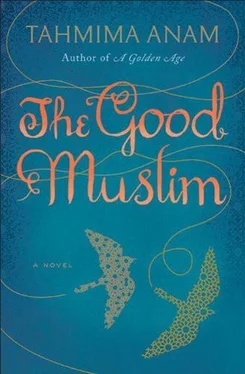The song ended. She heard the swish of a takoo lizard, its low staccato call. Should she have brought a lamp? Keep singing. A revolutionary song, ‘Amar protibader bhasha, amar protirodher agun.’ This one was getting her blood pumping. Her fingers moved and twisted and battered the keys. Sohail had loved this song. It would bring it all back for him. She kept an eye on his door, but it never stirred, not for the whole length of the song. A poem, then. She recited as much as she knew of Nazrul’s ‘Bidrohi’, keeping the tempo with three fingers on the harmonium. When she faltered on the second stanza, she imagined he would burst out of his room and finish the line for her. Still nothing. She switched to the tenderest Tagore song she knew, ‘Anondo Dhara’. Stream of Joy. She heard something. The creak of his door. A column of light, his shadow encased within it.
He was coming out. Her voice soared in anticipation. Something in his arms, it was too dark to make out. Just close your eyes and keep singing. ‘Anondo dhara bohichey bhuboney.’ Out he came, walking through the hallway and into the driveway. The shuffle of things. His books. Oh, he was moving them out. Don’t falter, just keep on going. He is only doing what he said he would do. Someone must be coming to collect the books. Whoever it was, she would stop them, convince them to leave the books in front of the house. Ha! What would he do then? Perhaps he just needs to hide them from Silvi — yes, that may be it. He’s protecting them. Never mind about the books. Keep singing. Bohichey bhuboney. In and out of his room, in and out; she could hear him occasionally grunting with the weight of the crates as he moved them to the driveway.
She was singing without thinking now, whatever song came to her. She started one without finishing another. Her body swayed with it, fingers and breath and tongue obeying. Eyes squeezed shut, believing that when she opened them, she would have sung them back to another time. A time when her brother wasn’t packing his books into crates. The singing was heating up the garden. This is how Tagore must have meant his songs to be done. Warming the spirit and the body. Words coming out with the roar and spit of a fire.
She opened her eyes.
The garden was orange black and Sohail stood in the middle of it, tossing books into a pile. Arm up, fling, watch the fire grow, fling. Was she still singing? She had stopped. Nothing but the sound of burning now, a low growl, and she wanted to move but she could not. The bucket was under the garden tap. She could attempt to fill it up, douse the fire. But its colour was speaking, its colour was saying, I am greater than you. My fire has silenced your fire.
It must be a dream. A great calm flowed through her. She took up the song again. While Ammoo dragged her into the house, while Ammoo filled the bucket and doused the flames, her voice remained tied to the verse. It was only when she heard Ammoo shout that she was roused, because Ammoo was saying it was all her fault, as she picked the floating scraps of paper out of her hair, as she rubbed her cheek, black with print that had turned back to ink. Only then did she realise what had happened.
Sohail had burned all the books.
‘You pushed him,’ Ammoo was shouting. ‘You pushed and you pushed.’ And Maya heard herself protest: ‘What could I do? I was only singing.’ But her mother, eyes as big as eggs now, said, ‘Did you listen to anything he said, up on that rooftop? Did you listen? No. You mocked him. You turned deaf and you mocked him.’
‘Because I knew where it was going.’
‘It didn’t have to. It did not. You led him here, calling him a mullah. Why? You couldn’t stand for him to be different.’
Et tu, mother.
Maya made the arrangements that very night, telephoning Sultana and packing her bags, her lungs full of the fire. In the morning, she disappeared. Two months later, the sermons on the roof were stopped. The little tin shack went up, and Sohail and Silvi built their world on top of the bungalow. Mrs Chowdhury died, silently and without a tear from her daughter. Zaid was born, brought into the world by a midwife whose face was covered by a piece of black netting. He opened his eyes to that, an empty space where the welcoming laugh should have been.
*
Maya took the bus to Tangail. Without unpacking her bag or greeting her friend, she began a shift at the clinic. The duty doctor was hassled, a spray of blood clinging to the collar of his shirt, as if he had bled there himself. ‘What are you doing here alone?’ he asked, rolling up his sleeves and bending over a sink, cracked, grey-rimmed.
‘I’m a friend of Sultana,’ she said. ‘From the medical college.’
He appeared too tired to ask any more questions. ‘There’s a cholera epidemic.’ The hallways were crowded; people threw down their gamchas and waited in the corridors. ‘You know what to do — ORT.’ He handed her a white jacket. She was dismissed.
She raced through one shift, then another, filled with a restless energy, and with the fear that if she sat down, if she thought about what she had done, she might be forced to run back to the bungalow. By the second night, she had found a stray stethoscope and wrapped it around her neck, and when she looked in the mirror she was glad to find a drawn face staring back at her, all signs of her heartache obscured by physical exhaustion.
When Sultana caught up with her the next morning, she was weaving through the ward, skirting between the patients on the floor, between the beds.
‘Time to stop,’ she said.
She blinked, taking a moment to recognise her. ‘I still have a few from last night.’
‘It’s been thirty-eight hours. Let’s go home.’
She blinked again, salt stinging her eyes. ‘Thank you,’ she said, turning her face away so her friend wouldn’t see her tears. ‘My things are in the other ward.’
She stayed until the cholera had done its worst. When it was time to go, Sultana’s husband said, ‘My friend Ranen has a clinic in Rangamati. They’re always shorthanded.’
After a fortnight in Khulna, and a week in Khagrachari, she found herself on the train to Rangamati. On the ferry she heard the sound of other languages, syllables with hard edges, and further still along her journey she saw women in long skirts and tunics, their faces small and squarish, babies tied to their backs with lengths of homespun, dark blue and yellow and red. They were called tribals, the Chakma and the Marma and the Santal, there before anyone else, before maps and Pakistan and the war. She saw a young girl and her mother eating with their fingers out of a leaf-wrapped parcel. They laughed with their jaws open and slapped one another on the cheek, gently, in admonishment, affection.
She finished her stint in Rangamati and took the train south again. When she stopped moving she found herself at the edge of the country, past the Chittagong port, and wandered on to an abandoned, tawny-sanded thread of a beach. Cox’s Bazaar. The water was cloudy but pleasantly warm, and as she dipped her ankles she found she could no longer taste the cinders, the tarry blackness that had got under her tongue and between her fingers. Now her tongue was clear, and as she squatted in the water, allowing her kameez to soak, she scrubbed between her toes, and the backs of her knees. At the guest-house, she continued to scrub at herself, this time with soap, splashing buckets of water over her head, attacking the dirt beneath her fingernails. She emerged red-faced, her hair wound into the thin striped towel that had come with the room.
She thought, for the first time since her departure, about her mother, and decided to send a telegram. After grappling with the words, she finally settled on I am fine. Please do not worr y. It is better this way.
Читать дальше












